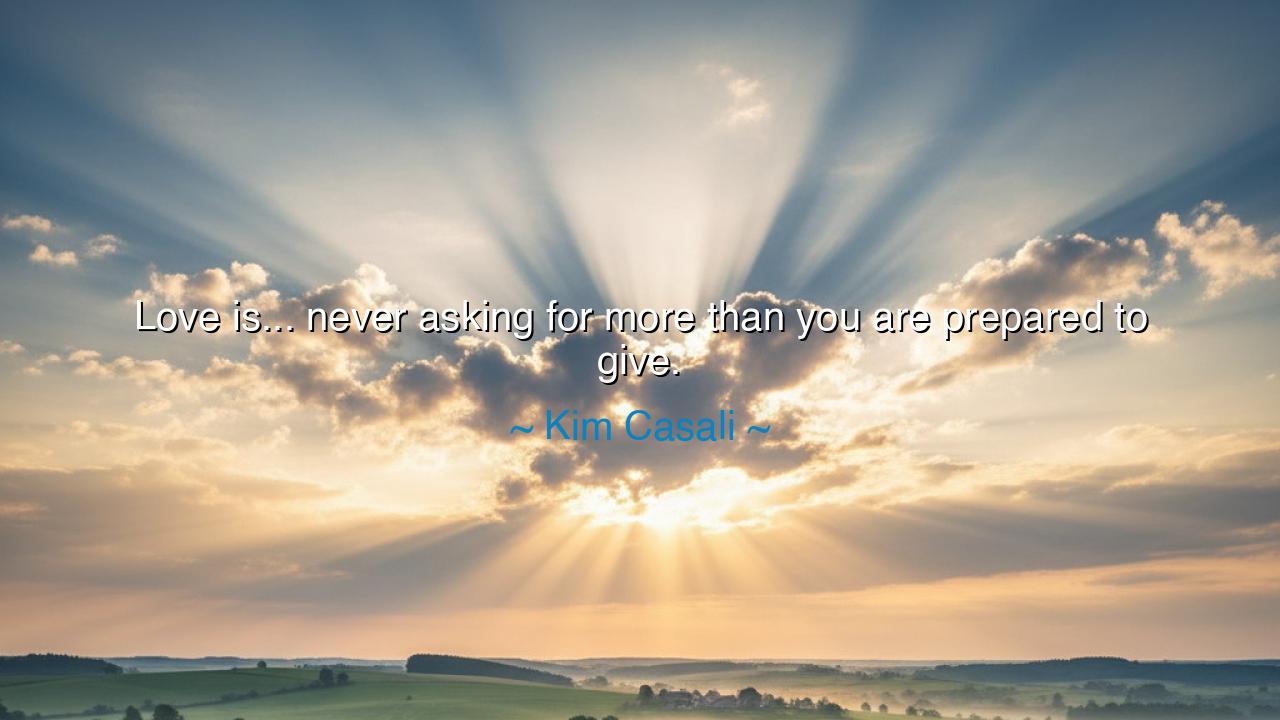
Love is... never asking for more than you are prepared to give.






When Kim Casali wrote, “Love is... never asking for more than you are prepared to give,” she captured one of the most profound truths of the human heart — that love is not a matter of demand, but of balance, humility, and reciprocity. In this simple sentence lies the essence of generosity in affection: the understanding that love cannot thrive where there is selfishness, nor endure where one takes more than one offers. Love, in its purest form, is a sacred exchange — a harmony between giving and receiving.
Casali, known for her tender “Love Is...” illustrations, was not speaking from abstraction, but from lived experience. She created her drawings for her husband, expressing affection through gentle wisdom. This particular truth was born from her realization that the strength of a relationship lies not in how much one receives, but in how much one willingly gives. To love truly is to measure not the worth of the other, but the depth of one’s own heart. It is to give without keeping score, and to refrain from asking what you would not yourself offer.
The ancients taught this too. In the parables of the East, a wise monk once said, “The vessel that pours must be ready to be poured into.” It is the same in love: when one gives freely, the universe replenishes; when one only demands, the vessel cracks. To ask for more than you are prepared to give is to tilt the balance of the soul — to turn affection into hunger, and companionship into control. True love, however, stands on equality of spirit. It knows that to receive deeply, one must first be capable of giving deeply.
Consider the story of Florence Nightingale, who devoted her life to the care of others during the Crimean War. She asked nothing that she was not herself prepared to give — comfort, time, compassion, even sleepless nights. She did not demand gratitude from her patients, nor praise from the world. Yet her selfless love for humanity transformed suffering into healing and inspired generations. In her, Casali’s words come alive: love asks only what it gives — and by that measure, it becomes divine.
In truth, love is a mirror, reflecting what you offer. Those who love to possess or to control soon find their hearts hollowed by disappointment, for they have confused love with desire. But those who love to uplift, to share, and to give, find themselves richer than before. To love rightly is to act with empathy — to feel the needs of another as your own, and to honor their limits as you hope they honor yours. It is a covenant, not of ownership, but of understanding.
The wisdom here is both gentle and stern. Never demand from another what you cannot bear to give. Do not ask for forgiveness if you cannot forgive; do not seek loyalty if your own heart wavers; do not crave trust if you are not trustworthy. Every expectation you place upon another must first be met within yourself. This is not weakness — it is the highest discipline of love, for it teaches the soul to lead by example rather than by desire.
Let this truth guide you in all your bonds — in friendship, in marriage, in kinship, and in service. When you love, let your giving be generous but honest; let your expectations be humble but clear. Speak not in the language of demands, but of devotion. The one who gives freely without measuring, and who receives with gratitude, shall never lack. For love given purely returns in ways unseen — not always from the same hands, but always from the same heaven.
Thus, remember the teaching of Kim Casali: Love is never asking for more than you are prepared to give. If you live by this, your heart will remain unburdened, your relationships will flourish, and your spirit will know peace. For love is not a transaction — it is a sacred offering. And the one who gives with sincerity, without asking for more than they can return, lives in the radiance of a love that is endless, self-sustaining, and eternally true.






AAdministratorAdministrator
Welcome, honored guests. Please leave a comment, we will respond soon